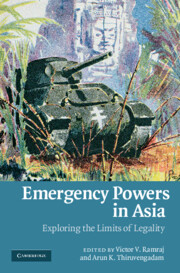Book contents
- Frontmatter
- Contents
- List of contributors
- Preface
- 1 Introduction: emergency powers and constitutionalism in Asia
- PART I Perspectives from legal and political theory
- PART II Postcolonial and post-conflict transitions
- PART III Emergencies, executive power and constitutional order
- PART IV The role of the courts
- 14 Constitutionalised emergency powers: a plague on Asian constitutionalism?
- 15 Political emergencies in the Philippines: changing labels and the unchanging need for legitimacy
- 16 Islamism as a response to emergency rule in Pakistan: the surprising proposal of Justice A. R. Cornelius
- 17 Asian judiciaries and emergency powers: reasons for optimism?
- Index
- References
17 - Asian judiciaries and emergency powers: reasons for optimism?
from PART IV - The role of the courts
Published online by Cambridge University Press: 04 August 2010
- Frontmatter
- Contents
- List of contributors
- Preface
- 1 Introduction: emergency powers and constitutionalism in Asia
- PART I Perspectives from legal and political theory
- PART II Postcolonial and post-conflict transitions
- PART III Emergencies, executive power and constitutional order
- PART IV The role of the courts
- 14 Constitutionalised emergency powers: a plague on Asian constitutionalism?
- 15 Political emergencies in the Philippines: changing labels and the unchanging need for legitimacy
- 16 Islamism as a response to emergency rule in Pakistan: the surprising proposal of Justice A. R. Cornelius
- 17 Asian judiciaries and emergency powers: reasons for optimism?
- Index
- References
Summary
Introduction
This chapter addresses the issue of the institutional checks on the invocation and use of emergency powers, by focusing on the role of judiciaries. Historically, judiciaries across the world have performed poorly when it comes to safeguarding the rights of individuals in times of emergency. This has led, over time, to the axiom that in times of emergency, judges cannot – and should not – reasonably be expected to act as the guardians of the constitution. Throughout this chapter, I will refer to this as the ‘conventional view’ of the role of courts during times of emergency.
The conventional view has witnessed a shift in the post-9/11 era. In recent years, courts in a number of jurisdictions have resorted to a variety of innovative strategies that are designed to curb executive power against the backdrop of the ongoing ‘war on terror’. At the time of writing, such decisions which have thwarted the traditional deference accorded to executive governments by courts have almost invariably emanated from jurisdictions within ‘the West’. My primary purpose in this chapter is to analyse whether a similar shift is likely to be occasioned by judiciaries in Asia.
Asia has been described as the ‘home of illiberal democracy’ and an area which is ‘perhaps the most difficult regional context for establishing the rule of law’.
- Type
- Chapter
- Information
- Emergency Powers in AsiaExploring the Limits of Legality, pp. 466 - 494Publisher: Cambridge University PressPrint publication year: 2009
References
- 2
- Cited by



